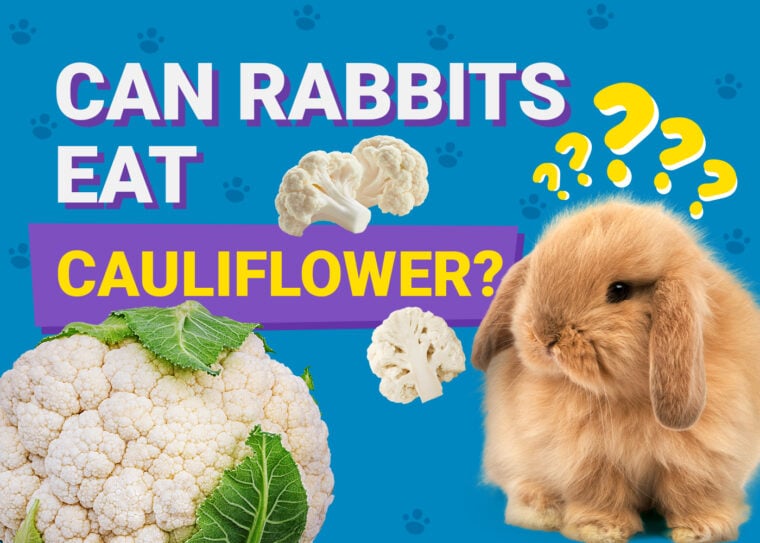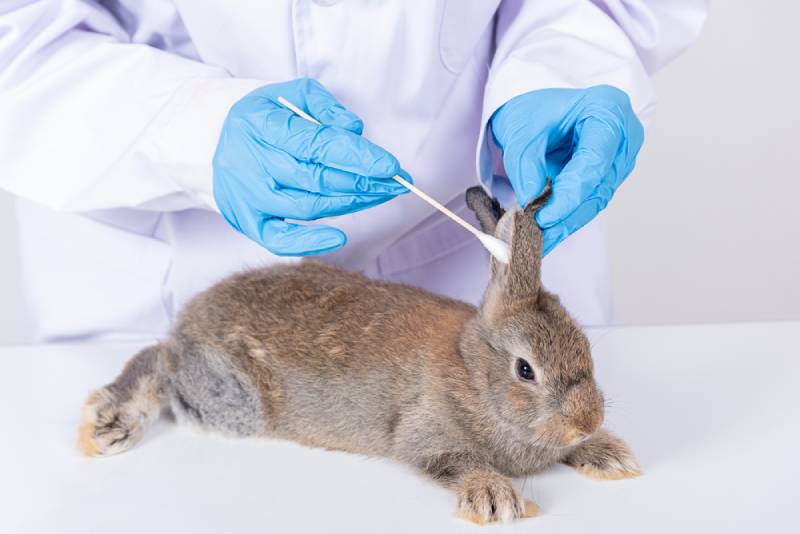
Click to Skip Ahead
Rabbits are herbivores that benefit from a variety of vegetables as part of a balanced diet. The main part of their diet should be hay and grass, with the addition of a daily mixture of fresh leafy greens and a small portion of rabbit pellets.
If you are wondering whether rabbits can enjoy cauliflower as part of their diet, the answer is they can, but in small amounts. They can eat both the florets and leaves, however too much can be problematic for our bunnies to digest. Read on to find out more.
Rabbits Can Eat Small Amounts of Cauliflower
Rabbits can undoubtedly enjoy a small amount of cauliflower in their diet. As with anything, however, you should give your rabbit appropriate portions to avoid any troubling issues from arising. Adding a controlled portion can be beneficial as part of a balanced diet.

Cauliflower & Its Benefits
Cauliflower quite literally translates to “cabbage flower.” It is in the genus of Brassica, or the mustard family. There are several species in the Brassica oleracea—like brussels sprouts, broccoli, and cabbage.
Potential Downfalls of Cauliflower for Rabbits
Gassiness is the primary cause of concern for the cauliflower in your rabbit’s diet. Cauliflower can lead to an increase in gas, particularly if they consume too much. It and other veggies in the family can have this effect such as broccoli, cabbage and kale.
While some rabbits can digest cauliflower with no issues, for others this increase in gas can wreak havoc on their gastrointestinal systems, causing them discomfort. This, in turn, can result in a reduced appetite and more serious issues.

How Much Cauliflower Is Suitable for Rabbits
Fresh veggies should only make up around 15% of your rabbits overall diet. 80% of their food intake should be good quality hay and grass and only 5% rabbit pellets. Of these vegetables, the majority should be a mixture of leafy greens, but rotating a variety of other vegetables is beneficial.
Cauliflower can be offered in small amounts occasionally, due to the issues that rabbits can have with digesting it. Rabbits can enjoy all parts of the cauliflower, with the leaves perhaps being the best part.
When offering any new food it is important to offer it in very small amounts to begin with and this is especially important with cauliflower. Give your rabbit approximately a thumb sized piece of cauliflower and monitor them for any signs of digestive issues. We don’t advise offering cauliflower at all to young, growing rabbits.
Because of the risk factors for gas, you should limit your rabbit’s cauliflower intake to no more than two to three times a week and in rotation with other veggies from the Brassica family. Each time you offer cauliflower, make sure it is a manageable portion, offering tiny florets.
Wash All Veggies
You must wash all of your rabbits’ veggies. It would help if you always bought fresh, organic options when you can. Thoroughly run cauliflower under the water to remove any pesticides or other contaminants from the surface.
Your rabbit’s system is incredibly sensitive, and these additives are not good for them at all. So, give them a quick rinse, and you’re good to go!

The Importance of the Correct Diet
Feeding the right diet to your rabbit is one of the most important things you can do to keep your pet healthy and happy. Many of the common diseases seen by vets in rabbits can be associated with a poor diet and could therefore be prevented. A diet without the correct balance of nutrients, especially fiber, can be linked to dental disease, gastrointestinal disease and obesity. Your vet is a good source of information and advice so reach out to them for help if needed.
Final Thoughts
So now you know that your rabbits can enjoy this tasty little vegetable—but in moderation only.
The importance of an appropriate diet for your bunny should not be underestimated, and it is essential that they are fed an unlimited amount of hay and grass each day. Vegetables should be primarily a variety of leafy greens, but other vegetables like cauliflower can also be added in to give a good balance of vitamins and minerals.









